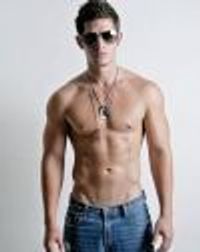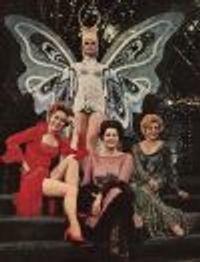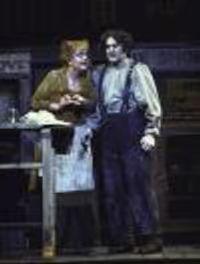Anyone going to the first preview of PROMISES, PROMISES tonight?
#100Anyone going to the first preview of PROMISES, PROMISES tonight?
Posted: 3/30/10 at 1:07pmlj, what are they saying specifically over at atc re. promises?
#101Anyone going to the first preview of PROMISES, PROMISES tonight?
Posted: 3/30/10 at 1:30pmThe more I think about this show, the more I enjoyed it. I really want to see it again sometime soon. I have been recommending it to people at work all day.
bethnor
Broadway Star Joined: 10/15/08
#102Anyone going to the first preview of PROMISES, PROMISES tonight?
Posted: 3/30/10 at 1:38pm
what are they saying specifically over at atc re. promises?
you know, you could just go over there. there won't be a rumble or anything.
or maybe there will be...
bk
Broadway Legend Joined: 7/20/03
#103Anyone going to the first preview of PROMISES, PROMISES tonight?
Posted: 3/30/10 at 1:41pm
This pandering to Mad Men and changing the year in which the show takes place is a little crass. Yes, the movie took place in 1960, but the film was topical for its time, and the musical was topical for ITS time. And adding choreography for a CHORUS in Basketball? I don't care if it's the most brilliant choreography in the history of musical theater - that song is a SOLO for the leading man. Did Mr. Hayes need the help? Certainly Jerry Orbach didn't and certainly Michael Bennett, Mr. Bacharach, Mr. David, Mr. Simon, and Mr. Moore knew whose number it was.
Updated On: 3/30/10 at 01:41 PM
#104Anyone going to the first preview of PROMISES, PROMISES tonight?
Posted: 3/30/10 at 1:51pmHmmm i see that ATC board users seem to have really enjoyed PROMISES. what a shock!
#105Anyone going to the first preview of PROMISES, PROMISES tonight?
Posted: 3/30/10 at 4:07pmWhat is the URL of the ATC board? Searching ATC in google did NOT work! Haha
bethnor
Broadway Star Joined: 10/15/08
#106Anyone going to the first preview of PROMISES, PROMISES tonight?
Posted: 3/30/10 at 4:41pm
www.talkinbroadway.com/allthatchat
this may break the terms of the treaty, though.
stephen4
Swing Joined: 11/23/09
#107Anyone going to the first preview of PROMISES, PROMISES tonight?
Posted: 3/30/10 at 5:20pm
We lost a wonderful talent this year....Bea Arthur. The Oscar’s might have forgotten Bea but I haven’t.
I found this clip of Miss Arthur's final interview with Bea discussing her career in her own words. The clip also shows Betty White, Carol Channing and Phyllis Diller. I think it’s for a show called, “Lunching with a Legend.”
I'd hate for a full interview with Bea or the other legendary ladies in the clip to go unseen.
http://lunchingwithalegend.com/
Cheers,
Stephen
#108Anyone going to the first preview of PROMISES, PROMISES tonight?
Posted: 7/10/10 at 2:32am
Earlier in this thread, there was some discussion of whether the overture was staged in the 1989 revival of Gypsy. I said that it had been, Gypsy9 said it hadn’t, then bk chimed in to agree with Gypsy9 and delivered himself of a rather condescending and slightly nasty statement to me. (What a surprise!)
First, he quoted something I wrote in response to Gypsy9: “Well, our memories differ on this. What I remember is staging going on behind the scrim. As I said, not nonstop staging, but some.
Anyway, not worth arguing about this.”
Then he wrote, “You're correct in your final statement because you are incorrect in your memory. That happens a lot, I'm afraid. You have two people here who saw the show multiple times telling you there was no staging. And I just asked Crista Moore and guess what - no staging during the overture.”
Honestly, I found bk's response to be so bizarre and annoying in its definitive dismissal of me -- not to mention kind of ridiculous in his assumption that when two people don't remember something happening and one person does, the two people who don’t remember it MUST be right -- that I haven't come back to this message board since.
Also, I can’t imagine why he thought Crista Moore would have remembered staging during the overture if she wasn’t onstage during it. Surely bk’s been around long enough to know how fallible people’s memories are, even about shows they were in.
I see that since that discussion, frontrowcentre2 has jumped in to say that he also remembers some staging in the 1989 revival. For some reason, bk didn't respond to him in the same condescending fashion in which he responded to me. In fact, he didn't respond to him at all. Perhaps he never read it, though I imagine he did since he posted in this thread after the post from frontrowcentre2 appeared.
I now have a video of the 1989 production (a different one than the one I mentioned earlier in the thread) and it very clearly shows a good deal of staging during the overture.
This is what it shows.
The curtain goes up. There's a scrim. Behind the scrim we see a worklight backstage in a theatre.
As the transition from “Everything’s Coming Up Roses” to “You’ll Never Get Away from Me” starts, a techie comes on and takes the worklight offstage (or at least someplace where it’s no longer visible on this video). Then he walks to various parts of the stage, checking lights. He claps his hands just before the brass starts up with “Funny, you’re a stranger who’s come here.” Then another guy comes onstage. During the famous horn transition, the first techie faces offstage (stage-right wings) as he walks backward away from stage right toward stage left, gesturing toward someone off stage right. Then he exits stage left.
Meanwhile, the second guy (who will play Georgie in the first scene) has been looking at what appear to be some note cards in his hands. Then Uncle Jocko comes on and talks to Georgie, miming a little dancing and making a gesture clearly intended to indicate that he’s talking about a curvaceous woman. Then Uncle Jocko walks off stage left and Georgie exits stage right.
At this point, the strip music begins. One of the little girls who’ll be a contestant in Uncle Jocko’s show enters with her mother. They both look up as the Uncle Jocko flat comes down from the flies. The little girl gets very excited, jumping up and down.
Then the show curtain comes down as the orchestra goes into “Mr. Goldstone.”
I think bk owes me an apology, though I'm not going to hold my breath waiting for one. Gypsy9 was perfectly polite in the disagreement, but bk, as is all too typical of him, wasn't.
If bk doubts me, I'm happy to show him the video (which is mostly poor quality but you can see everything I described quite clearly) the next time he's in New York.
#109Anyone going to the first preview of PROMISES, PROMISES tonight?
Posted: 1/13/11 at 11:48pm
I don't know why people get so uptight about minor changes to DIRECTION in a piece like this. Bringing in dancers to a solo song? Sometimes it works, sometimes it doesn't. But the audience LOVED "Basketball" when I saw it, and it didn't feel at all to me like Hayes had been upstaged.
Same with the well-staged Overture ballet. Maybe it's just me, but a nonstaged overture engages me more as a music lover than as an attender of theater. i try to dissect the musical themes, pick apart the orchestration, listen for signature touches of the composer. But when the overture is staged, my "watching a show" brain takes over, and I'm instantly engaged at a different level than I would as a person listening to a program piece of concert music.
Videos





